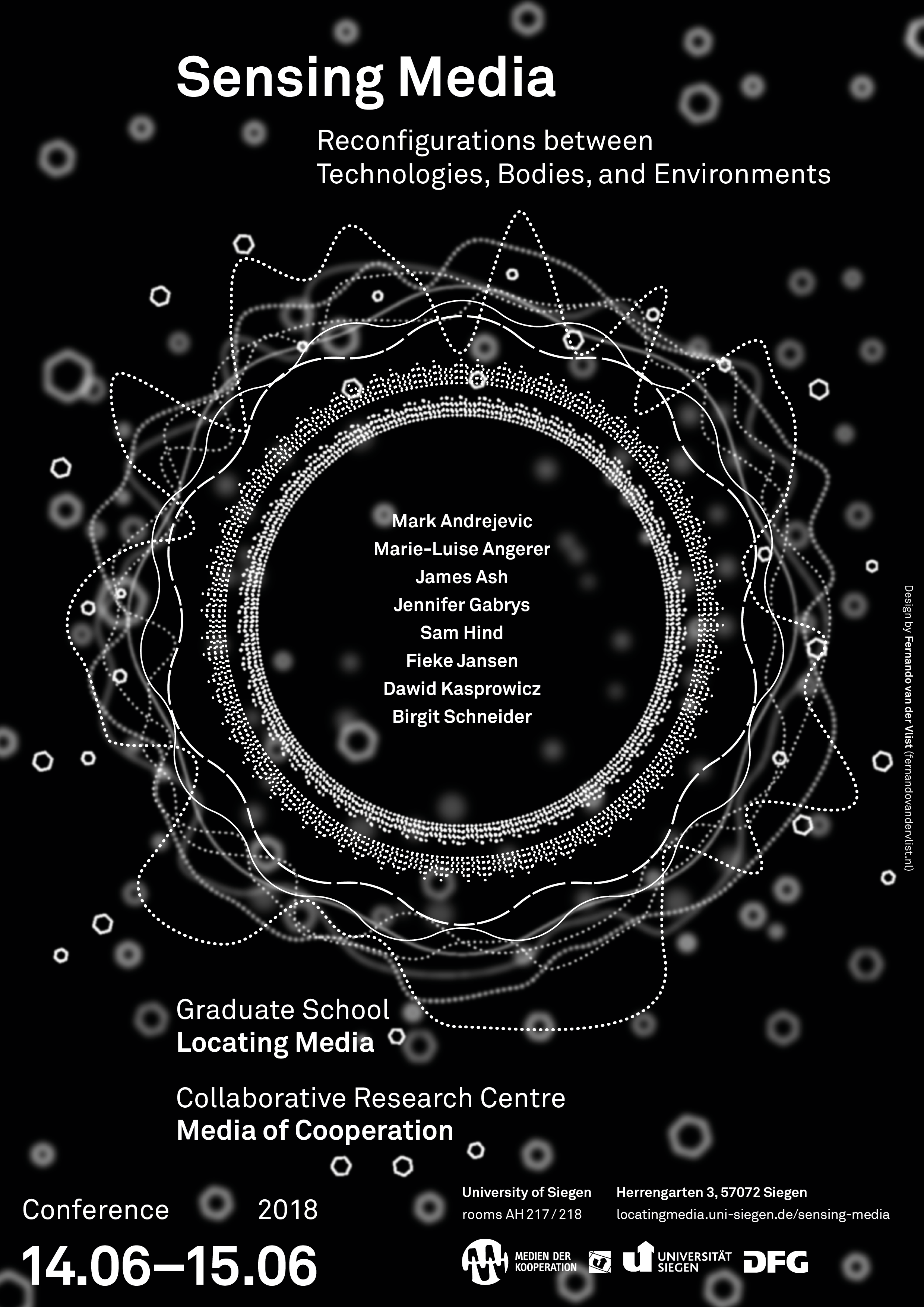
-
University of Siegen
June 14-15, 2018
Herrengarten 3
Room AH 217-218SENSING
MEDIARECONFIGURATIONS
BETWEEN TECHNOLOGIES,
BODIES AND ENVIRONMENTS
Ever more sensors surround us and attach to us. They populate smart devices, homes, factories, cars, and cities. They register, chart, and process bodies and environments, allowing for new modes of knowledge as well as forms of control. Sensor-based media capture and analyze human behavior in order to gain a better understanding of their actions and affects. It is therefore worth asking how sensor-based media reconfigure the relation between technologies, (human) bodies and environments. By focusing on the plethora of different sensors that transform devices into smart devices, homes into smart homes, and augment our environments to produce a non-human sensorium, the conference aims to map the contemporary modes of sensor-based sense-making which are deeply intertwined with the promise of the automation of labor, mobility, decisions and knowledge production. Framed as autonomous agents, assistants, companions or surroundings, sensor-based technologies rely on as well as produce continuous data streams that are captured, cleaned, combined, distributed, analyzed and acted upon. As a result, new modes of knowing, interacting and acting emerge between humans and these sensory environments. These will be explored in the conference by addressing a broad range of questions such as: What kinds of knowledge are made possible by the data gathered, processed and enacted through sensor-based media? What types of interaction are prescribed or made possible between humans and sensory environments? How is agency redistributed and experience reconfigured by sensor-based media? How are humans implicated in the processes of automated sense-making and action?
Thursday, June 14, 2018
| 13:30-14:00 | Welcome | |
|
14:00-15:00 |
Phase Media: Space, Time and Smart Objects | James Ash |
|
15:00-15:30 |
Coffee Break | |
|
15:30-16:30 |
Blind Spots | Sam Hind |
|
16:30-17:30 |
Drone Cartographies: The Operational Map | Mark Andrejevic |
|
17:30-18:00 |
Coffee Break | |
|
18:00-19:00 |
Intensive Milieus | Marie-Luise Angerer |
|
20:00 |
Dinner @ Brasserie |
Friday, June 15, 2018
| 09:30-10:30 | Environmental Aesthetics: Nature Writing with Sensor Technologies? | Birgit Schneider |
| 10:30-11:00 | Coffee Break | |
| 11:00-12:00 | Environment as Experiment in Sensing Technology | Jennifer Gabrys |
| 12:00-13:00 | Lunch | |
| 13:00-14:00 | Creative Methodologies for Mapping Data Flows and Infrastructure | Fieke Jansen |
| 14:00-15:00 | The Instantaneous Past: On Body Images and Algorithmic Proximity | Dawid Kasprowicz |
| 15:00-15:30 | Wrap Up |
Participation is free. We however ask you kindly to register at info@www053.zimt.uni-siegen.de
- James Ash: Phase Media: space, time and smart objects
This paper theorises how smart objects, understood as internet-connected and sensor-enabled devices, generate phases. Phases can be defined as space-times that are disclosed through the perturbations between smart objects, which work to modulate the spatio-temporal intelligibility of both humans and non-humans. Examining a range of objects and services from the Apple Watch to Nest Cam I suggest that the modulation of spatio-temporal intelligibility is actively designed to increase the use of, and reliance upon, these devices. - Sam Hind: Blind Spots
- Mark Andrejevic: Drone Cartographies: The Operational Map
This presentation draws on recent work on the “operational” image to trace the logic of post-representational mapping in the era of automated media. It considers the shift from logics of verticality to those of environmentality associated with drone logics of pre-emption and counter-insurgency which rely on what Ben Anderson has described as: „the continuous attempt to know all of life without limit or remainder that is central to ‘full spectrum’ dominance.”
Mark Andrejevic is Professor of Media Studies at Pomona College and Monash University. - Marie-Luise Angerer: Intensive Milieus
In the early twenty-first century, the relations between bodies and their (external and internal) environments have been rewired by information technologies; body data communicate with environmental data, neuronal signals control the temperatures of bodies and living environments, and the ‘little sisters’ (a term coined by Rosalind Picard for Siri and others in an effort to allay the fear of Big Data) have a growing role in organizing the routines of everyday life (Picard 2010). Engineers are rushing to develop digital assistants, ‘new others’ by our side, non-humans capable of judicious planning and sensitive action that will presumably surpass or supplant humans even in the one domain where they were (still) distinct from machines: until the late twentieth century, affect and emotion were regarded as the dimension of human existence that could be neither calculated nor disregarded. The algorithms of affective computing have long begun to intervene to link up man and machine in affective and thus psycho-cybernetic ways.
Bio: Marie-Luise Angerer is Professor of Media Theory at the University of Potsdam and the Director of the Brandenburg Center for Media Studies (ZeM). The focus of her research is on affect and neuroscientific reformulations of desire and sexuality, intensive milieus and sensing. She is the author of numerous books, including among others Body Options (1999), Vom Begehren nach dem Affekt (2007), translation (including a new chapter) as Desire After Affect (2014), and Ecology of Affect (2017); she is the co-editor of Timing of Affect (with B. Bösel and M. Ott, 2014), and of Affective Transformations. Politics. Algorithms.Media (with B. Bösel, G. Gramlich and M. Rautzenberg, forthcoming). - Birgit Schneider: Environmental Aesthetics: Nature Writing with Sensor Technologies?
- Jennifer Gabrys: Environment as Experiment in Sensing Technology.
- Fieke Jansen: Creative Methodologies for Mapping Data Flows and Infrastructure
- Dawid Kasprowicz: The Instantaneous Past: On Body Images and Algorithmic Proximity

